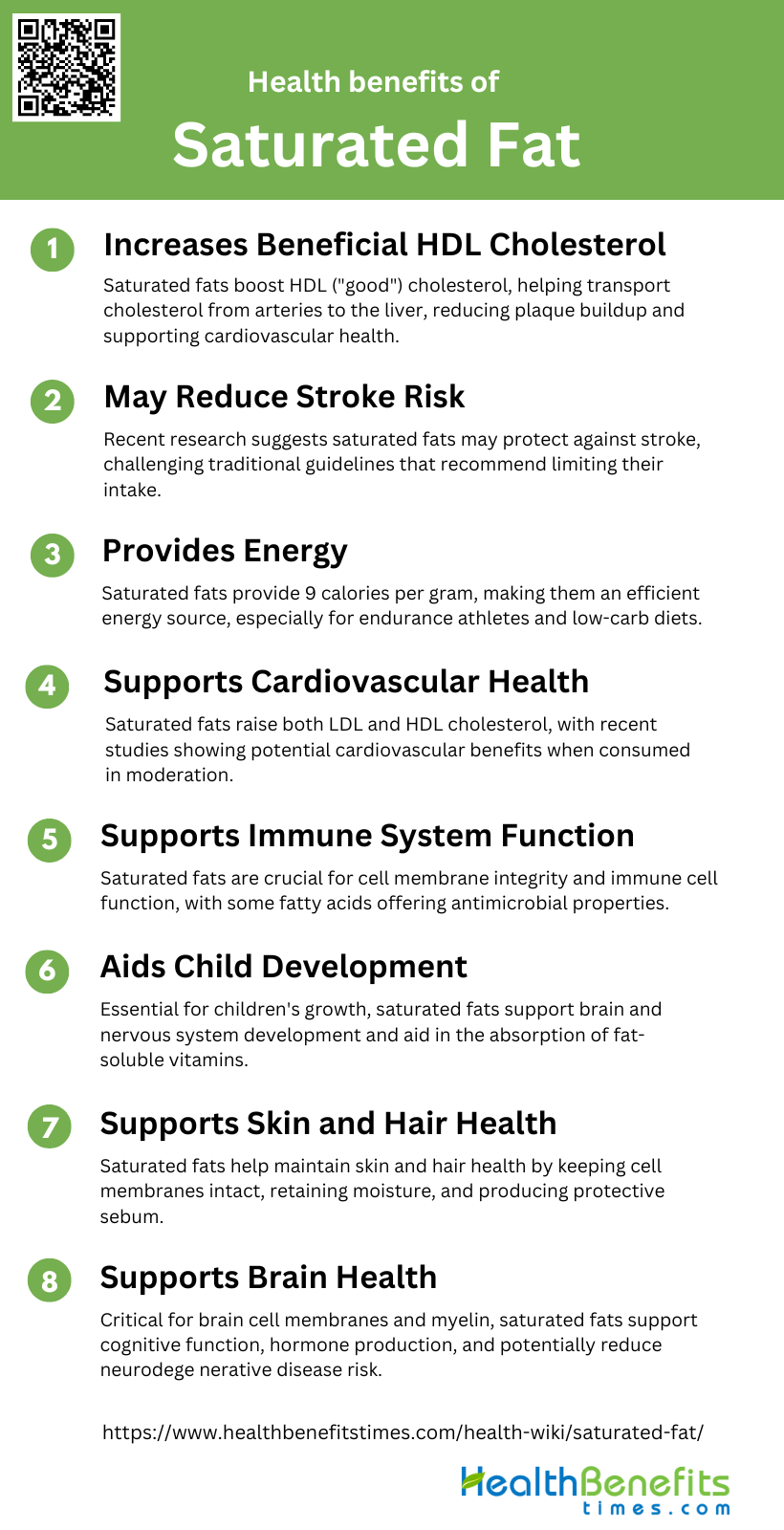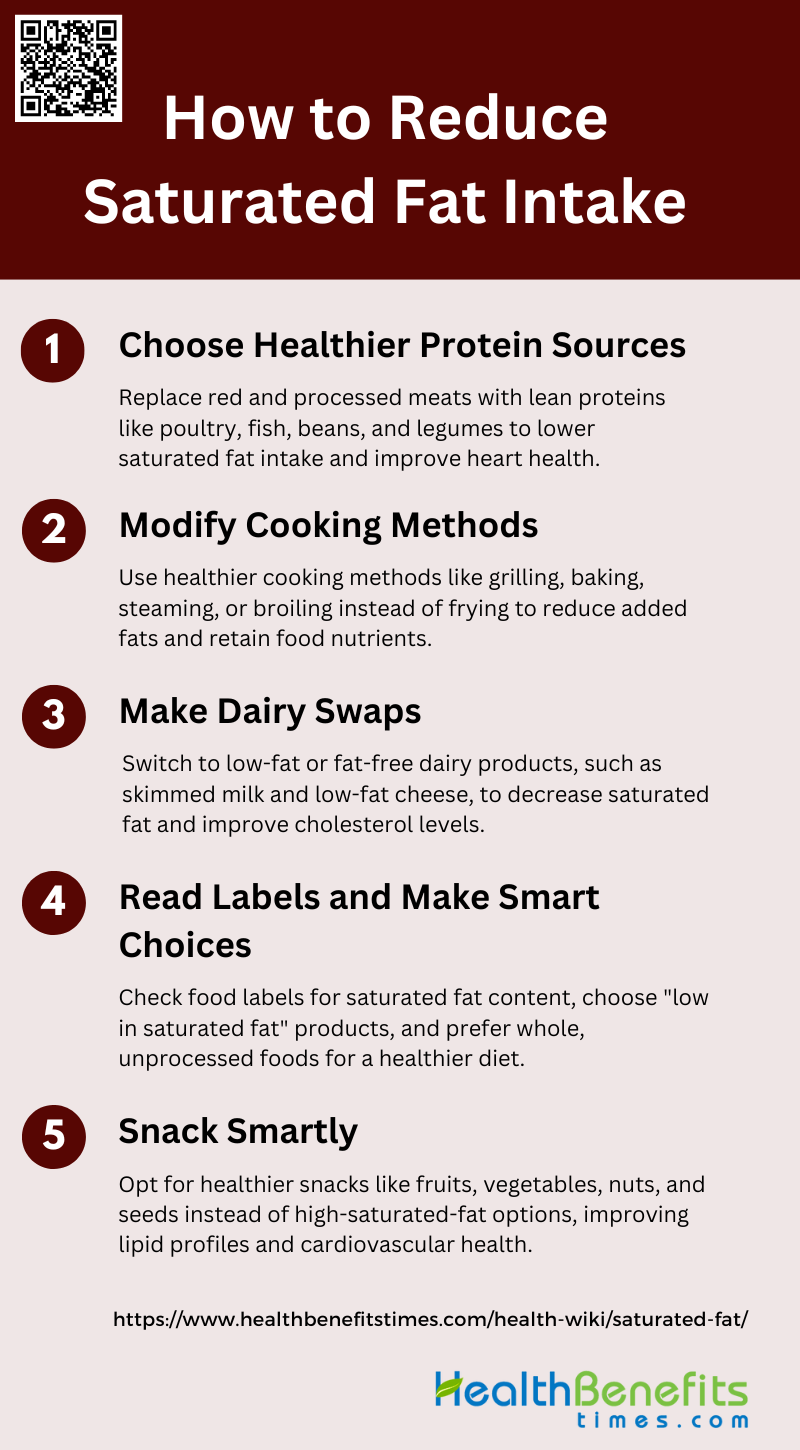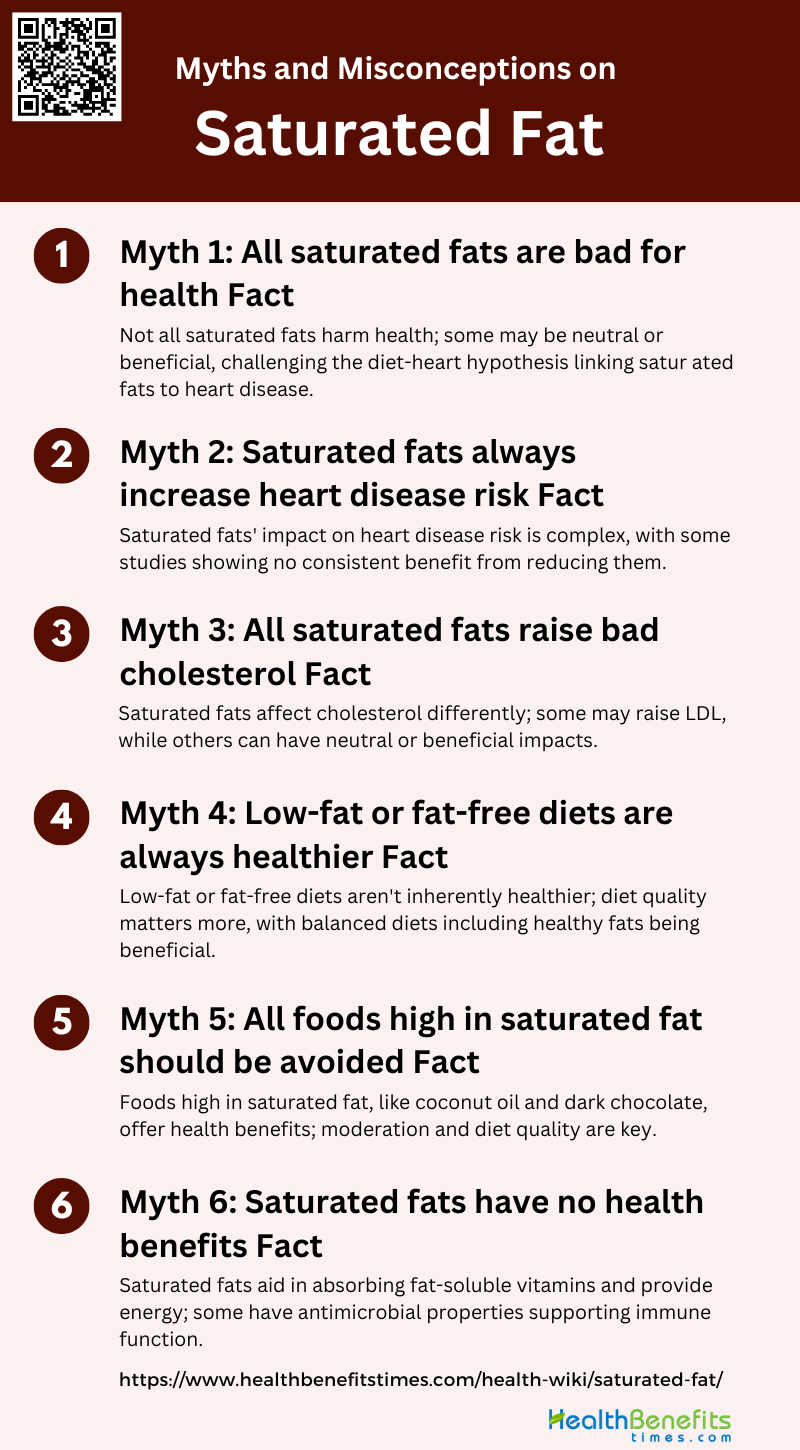Saturated fat is a type of dietary fat that is typically solid at room temperature and is found in animal products such as meat, butter, and cheese, as well as certain plant oils like coconut and palm oil. Chemically, saturated fats have no double bonds between the carbon atoms of the fatty acid chains, which make them “saturated” with hydrogen atoms. This structural characteristic contributes to their stability but also impacts their role in human health. High intake of saturated fats has been linked to increased levels of low-density lipoprotein (LDL) cholesterol in the blood, which is a risk factor for cardiovascular diseases such as coronary heart disease. However, the relationship between saturated fat intake and health outcomes is complex and can be influenced by overall dietary patterns and lifestyle factors.
Differences between saturated and unsaturated fats
Saturated and unsaturated fats differ significantly in their chemical structure and health impacts. Saturated fats, typically found in animal products, contain no double bonds between carbon atoms, leading to a more rigid structure. In contrast, unsaturated fats, commonly found in plant oils, have one or more double bonds, resulting in a more flexible structure. Health-wise, saturated fats are associated with higher levels of LDL cholesterol and an increased risk of coronary heart disease (CHD). Conversely, unsaturated fats, particularly polyunsaturated fatty acids (PUFAs) and monounsaturated fatty acids (MUFAs), are linked to lower LDL cholesterol levels and a reduced risk of CHD. Additionally, unsaturated fats have been shown to have beneficial effects on insulin sensitivity and inflammation, which are not observed with saturated fats. Furthermore, replacing saturated fats with unsaturated fats can lead to modest weight loss and improved body composition. These differences underscore the importance of dietary fat composition in managing health risks and promoting overall well-being.
Sources of Saturated Fat
Saturated fats are a type of dietary fat found in various foods. They are typically solid at room temperature and can contribute to increased cholesterol levels in the blood. Understanding the sources of saturated fats can help in making healthier dietary choices. Here are some common sources of saturated fat:
1. Animal-based Sources
Animal-based sources of saturated fat include a variety of dairy and meat products. High intakes of milk, cheese, yogurt, and butter have been studied extensively, with mixed results regarding their impact on mortality. While these dairy products were not significantly associated with an increased risk of mortality, high intakes of meat and processed meat were linked to a higher risk of mortality, particularly in Western populations. Interestingly, a subanalysis of Asian studies suggested a decreased risk associated with high meat intake, indicating that cultural dietary patterns may influence these outcomes. Additionally, animal fats are a primary source of saturated fatty acids, cholesterol, and trans-fatty acids, which are often targeted for reduction in health-conscious dietary reforms.
2. Plant-based Sources
Plant-based sources of saturated fat are less common but include items such as coconut oil and palm oil. These oils are unique among plant oils for their high saturated fat content. Coconut oil, in particular, has been popularized for its purported health benefits, although it remains a source of saturated fat and should be consumed in moderation. Palm oil is widely used in processed foods and has been scrutinized for its environmental impact as well as its health implications. Despite being plant-based, these oils contribute to the overall intake of saturated fats, which are linked to increased LDL cholesterol levels and, consequently, a higher risk of heart disease.
3. Baked and Fried Foods
Baked and fried foods are significant contributors to saturated fat intake, often due to the use of butter, lard, and palm oil in their preparation. Items such as pies, pastries, cakes, and biscuits are typically high in saturated fats, which can elevate LDL cholesterol levels and increase the risk of heart disease. The consumption of these foods is a concern for public health, as they are not only high in saturated fats but also often contain Tran’s fats and added sugars. Reducing the intake of these foods or reformulating them to include healthier fat alternatives is a strategy that has been explored to mitigate their negative health impacts.
Health benefits of Saturated Fat
Saturated fats, often misunderstood, play essential roles in the body. They provide energy, support cell growth, and protect organs. Here are some health benefits of saturated fat:
1. Increases Beneficial HDL Cholesterol
HDL cholesterol plays a crucial role in transporting cholesterol from the arteries to the liver, where it can be processed and removed from the body. This process helps to reduce the risk of plaque buildup in the arteries, thereby supporting cardiovascular health. Studies have indicated that while saturated fats may increase low-density lipoprotein (LDL) cholesterol, they also significantly raise HDL cholesterol levels, which can offset some of the potential negative effects of LDL cholesterol.
2. May Reduce Stroke Risk
Contrary to the long-held belief that saturated fats are detrimental to cardiovascular health, recent research suggests that they may actually have protective effects against stroke. A meta-analysis of prospective cohort studies found no significant association between saturated fat intake and an increased risk of stroke. In fact, some studies have indicated a potential reduction in stroke risk with higher saturated fat consumption. This challenges the traditional dietary guidelines that recommend limiting saturated fat intake to prevent cardiovascular diseases, including stroke.
3. Provides Energy
This makes them an efficient fuel source for the body, especially during periods of increased physical activity or when carbohydrate intake is low. The body can store saturated fats and utilize them as a long-term energy reserve, which is particularly beneficial for endurance athletes and individuals following low-carbohydrate diets. The energy provided by saturated fats can help maintain overall metabolic function and support daily physical activities 6.
4. Supports Cardiovascular Health
The relationship between saturated fats and cardiovascular health is complex and has been the subject of much debate. While saturated fats can increase LDL cholesterol, they also raise HDL cholesterol, which is beneficial for cardiovascular health. Moreover, recent studies have shown that the type of LDL particles increased by saturated fats are larger and less likely to contribute to atherosclerosis. Additionally, whole foods rich in saturated fats, such as dairy and unprocessed meats, have not been associated with an increased risk of cardiovascular disease. These findings suggest that saturated fats can be part of a heart-healthy diet when consumed in moderation.
5. Supports Immune System Function
They are essential components of cell membranes, providing structural integrity and fluidity, which are crucial for the proper functioning of immune cells. Certain saturated fatty acids, such as lauric acid found in coconut oil, have antimicrobial properties that can help protect the body against infections. Additionally, saturated fats are involved in the production of signaling molecules that regulate immune responses. Adequate intake of saturated fats can thus support the body’s ability to fight off pathogens and maintain overall immune health.
6. Aids Child Development
They provide a concentrated source of energy necessary for rapid growth and are crucial for the development of the brain and nervous system. Saturated fats are also involved in the absorption of fat-soluble vitamins (A, D, E, and K), which are vital for various physiological functions, including vision, bone health, and immune function. Ensuring that children receive an adequate amount of saturated fats in their diet can support their overall development and long-term health.
7. Supports Skin and Hair Health
They help to keep cell membranes intact, ensuring that skin cells retain moisture and remain resilient. This can prevent dryness and improve the overall texture and appearance of the skin. Additionally, saturated fats are involved in the production of sebum, an oily substance that lubricates the skin and hair, providing a natural barrier against environmental damage. Including sufficient saturated fats in the diet can thus contribute to healthier, more vibrant skin and hair.
8. Supports Brain Health
The brain is composed of nearly 60% fat, and saturated fats are a critical component of brain cell membranes and myelin, the protective sheath around nerve fibers. These fats are essential for maintaining the structure and function of brain cells, facilitating efficient communication between neurons. Saturated fats also play a role in the production of certain hormones and neurotransmitters that are vital for cognitive function and mood regulation. Adequate intake of saturated fats can support brain health, potentially improving cognitive performance and reducing the risk of neurodegenerative diseases.
Effects of saturated fat on Health
Saturated fats have a significant impact on health, influencing various bodily functions. While they are necessary in moderation, excessive intake can lead to health issues. Here are some effects of saturated fat on health:
1. Impact on Cholesterol Levels
Saturated fats have long been associated with increased levels of low-density lipoprotein cholesterol (LDL-C), which is a known risk factor for cardiovascular disease (CVD). Studies have shown that reducing saturated fat intake can lead to a decrease in serum cholesterol levels, particularly LDL-C. For instance, a systematic review and meta-analysis found that reducing saturated fat intake significantly lowered total cholesterol and LDL-C levels in children and adolescents without adverse effects on growth and development. Another review highlighted that replacing saturated fats with polyunsaturated fats resulted in a greater reduction in serum cholesterol and cardiovascular events. However, some recent studies argue that the relationship between saturated fat and cholesterol is more complex, suggesting that not all saturated fats have the same impact on cholesterol levels.
2. Heart Disease Risk
The relationship between saturated fat intake and heart disease risk has been a subject of extensive research and debate. Reducing saturated fat intake has been shown to lower the risk of cardiovascular events. A comprehensive review of randomized controlled trials indicated that reducing dietary saturated fat reduced the risk of cardiovascular events by 17%. However, the evidence on the impact of saturated fat on all-cause and cardiovascular mortality remains less clear. Some studies suggest that the type of fat replacing saturated fat in the diet is crucial, with polyunsaturated fats being more beneficial than carbohydrates or monounsaturated fats. Despite these findings, some researchers argue that the evidence linking saturated fat to heart disease is not as strong as once believed, and other dietary factors may play a more significant role.
3. Weight Gain and Obesity
The role of saturated fat in weight gain and obesity is complex and multifaceted. While traditional dietary guidelines have recommended reducing saturated fat to prevent obesity, recent evidence suggests that the relationship is not straightforward. Some studies have shown that replacing saturated fats with carbohydrates, especially refined sugars, can lead to weight gain and increased obesity rates. Conversely, diets high in saturated fats but low in carbohydrates have been associated with weight loss and improved metabolic health in some cases. Therefore, the impact of saturated fat on weight gain and obesity may depend on the overall dietary context and the types of foods consumed.
4. Inflammation
Saturated fats have been implicated in promoting inflammation, which is a key factor in the development of chronic diseases such as cardiovascular disease and type 2 diabetes. Research indicates that high intake of saturated fats can lead to systemic low-grade inflammation, contributing to metabolic syndrome and insulin resistance. However, the inflammatory response to saturated fats may vary depending on the individual’s overall diet and lifestyle. Some studies suggest that other dietary components, such as polyunsaturated fats, can counteract the pro-inflammatory effects of saturated fats. Additionally, the impact of saturated fats on inflammation may be less significant compared to other lifestyle factors, such as physical activity and overall diet quality.
How to Reduce Saturated Fat Intake
Reducing saturated fat intake is crucial for maintaining heart health and overall well-being. Simple dietary changes can significantly lower your consumption of these fats. Here are some effective ways to reduce saturated fat intake:
1. Choose Healthier Protein Sources
Opting for healthier protein sources can significantly reduce saturated fat intake. Replacing red and processed meats with lean proteins such as poultry, fish, beans, and legumes can lower the risk of cardiovascular diseases. Studies have shown that substituting saturated fats with polyunsaturated fats, found in fish and plant-based proteins, can reduce LDL cholesterol levels and improve heart health. Additionally, plant-based proteins provide fiber and essential nutrients that contribute to overall health, making them a beneficial alternative to high-saturated-fat animal proteins.
2. Modify Cooking Methods
Altering cooking methods is an effective way to reduce saturated fat intake. Instead of frying foods, which can add unhealthy fats, consider grilling, baking, steaming, or broiling. These methods not only reduce the need for added fats but also help retain the nutritional value of the food. Research indicates that avoiding fried foods and using healthier cooking techniques can lead to significant reductions in saturated fat consumption and improve lipid profiles. Using non-stick cookware and cooking sprays can also minimize the need for added fats during meal preparation.
3. Make Dairy Swaps
Swapping full-fat dairy products for low-fat or fat-free versions can substantially decrease saturated fat intake. Studies have demonstrated that using skimmed milk instead of full-fat milk and opting for low-fat cheese and yogurt can effectively lower serum cholesterol levels and reduce cardiovascular risk. While some research suggests that certain full-fat dairy products may have neutral or even beneficial effects on heart health, the overall consensus supports the reduction of saturated fat through dairy swaps to improve lipid profiles and reduce cardiovascular events.
4. Read Labels and Make Smart Choices
Reading food labels and making informed choices can help manage saturated fat intake. Many processed and packaged foods contain hidden saturated fats, so it’s essential to check the nutritional information for saturated fat content. Choosing products labeled as “low in saturated fat” or “heart-healthy” can aid in reducing overall intake. Research highlights the importance of consumer awareness and education in making healthier dietary choices, which can lead to better cardiovascular outcomes. Being vigilant about ingredient lists and opting for whole, unprocessed foods can further support a low-saturated-fat diet.
5. Snack Smartly
Selecting healthier snacks is crucial for reducing saturated fat intake. Instead of reaching for chips, cookies, or other high-saturated-fat snacks, consider fruits, vegetables, nuts, and seeds. These alternatives not only provide essential nutrients and fiber but also help maintain a balanced diet. Studies have shown that incorporating nuts and seeds, which are high in unsaturated fats, can improve lipid profiles and reduce the risk of cardiovascular diseases. Additionally, preparing homemade snacks allows for better control over ingredients and can help avoid the hidden saturated fats often found in store-bought options.
Dietary Guidelines for Saturated fat
Understanding the role of saturated fat in our diet is essential for maintaining heart health and overall well-being. While some saturated fat is necessary, excessive consumption can lead to health issues. Below are key guidelines to help manage your saturated fat intake effectively:
1. Recommended Daily Intake
The recommended daily intake of saturated fat varies slightly among different health organizations, but a common guideline is to limit saturated fat to less than 10% of total energy intake (TEI). For instance, the World Health Organization (WHO) recommends reducing saturated fat intake to below 10% of TEI and replacing it with polyunsaturated fats (PUFA) if the intake exceeds this limit. Similarly, the Dietary Guidelines for Americans also suggest keeping saturated fat intake below 10% of daily calorie intake. These recommendations are based on evidence linking high saturated fat consumption to increased levels of low-density lipoprotein (LDL) cholesterol, a known risk factor for cardiovascular disease (CVD).
2. Guidelines from Health Organizations
Health organizations worldwide have consistently recommended reducing saturated fat intake to mitigate the risk of cardiovascular diseases. The WHO and the UK’s Scientific Advisory Committee on Nutrition (SACN) both endorse guidelines to restrict saturated fat intake to less than 10% of total energy intake. The U.S. Dietary Guidelines for Americans also align with this recommendation, emphasizing the replacement of saturated fats with unsaturated fats to improve heart health. Despite some debate and emerging research questioning the strength of the evidence linking saturated fat to heart disease, the prevailing consensus among major health organizations remains to limit saturated fat intake as part of a balanced diet.
Myths and Misconceptions on Saturated fat
Saturated fat is often surrounded by myths and misconceptions that can lead to confusion about its role in a healthy diet. It’s important to separate fact from fiction to make informed dietary choices. Here are some common myths and misconceptions about saturated fat:
Myth 1: All saturated fats are bad for health
Fact: Not all saturated fats are detrimental to health. While some types of saturated fats can increase LDL cholesterol levels, which is a risk factor for cardiovascular disease, the relationship is not straightforward. Recent studies have shown that the diet-heart hypothesis, which posits that saturated fat intake directly leads to heart disease, is not consistently supported by evidence. In fact, some saturated fats may have neutral or even beneficial effects on health, such as an inverse relationship with obesity-related type 2 diabetes.
Myth 2: Saturated fats always increase heart disease risk
Fact: The belief that saturated fats invariably increase the risk of heart disease is overly simplistic. Meta-analyses and systematic reviews have found no consistent benefit to reducing dietary saturated fat for lowering cardiovascular disease (CVD) mortality. Some studies even suggest that the type of fat replacing saturated fats in the diet (e.g., polyunsaturated fats vs. carbohydrates) plays a significant role in determining cardiovascular outcomes.
Myth 3: All saturated fats raise bad cholesterol
Fact: Not all saturated fats have the same effect on cholesterol levels. While some saturated fats can raise LDL cholesterol, others may have a neutral or even beneficial impact. The overall effect of saturated fats on cardiovascular health is influenced by various factors, including the type of saturated fat and the overall dietary context. For instance, replacing saturated fats with polyunsaturated fats can be beneficial, but replacing them with carbohydrates may not yield the same positive outcomes.
Myth 4: Low-fat or fat-free diets are always healthier
Fact: Low-fat or fat-free diets are not necessarily healthier. The focus should be on the quality of the diet rather than the fat content alone. Diets that eliminate saturated fats but are high in processed foods and simple carbohydrates may not improve health outcomes and could even exacerbate issues like obesity and type 2 diabetes. A balanced diet that includes healthy fats, such as those from nuts, seeds, and fish, is more beneficial for overall health.
Myth 5: All foods high in saturated fat should be avoided
Fact: Not all foods high in saturated fat need to be avoided. Foods like coconut oil, dark chocolate, and certain dairy products contain saturated fats but also offer other health benefits, such as antioxidants and essential nutrients. The key is moderation and the overall quality of the diet. Avoiding processed foods and focusing on whole, nutrient-dense foods can lead to better health outcomes.
Myth 6: Saturated fats have no health benefits
Fact: Saturated fats do have some health benefits. They are essential for the absorption of fat-soluble vitamins (A, D, E, and K) and provide a source of energy. Some saturated fats, like those found in coconut oil, have been shown to have antimicrobial properties and may support immune function. The overall impact of saturated fats on health depends on the type and amount consumed, as well as the overall dietary pattern.





